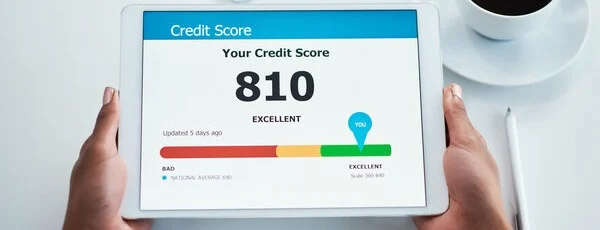Why is My Credit Score Different on Different Sites?

- Your credit score can vary for several reasons, including different scoring formulas.
- Credit scores are meant to provide insight into your borrowing history.
- Understanding why your credit score is different on different websites could help you learn how credit works.
Table of Contents
Regularly checking your credit scores can be a smart way to keep an eye on your credit health. Any sudden dips, and you know you need to take action.
One key thing to notice is that it's scores, plural. You have dozens of different credit scores. Adding to the confusion, those scores don’t always match one another.
For example, you might get a credit score from your credit card company that shows you have a 670. You could go directly to your favorite personal finance app and check your score, only to find it's over 700. Then you get a letter from your lender saying your credit score is 650!
Which score is right? The confusing answer is: They all are.
A lot goes into generating a credit score. It starts with information from your credit reports. A credit scoring agency then processes that information using a special mathematical formula called a scoring model.
All the different factors mean there are a lot of reasons your score could vary from source to source. Here's the quick-and-dirty explanation (or keep scrolling for the full story).
This article contains general information for educational use. Freedom Debt Relief isn't a credit repair organization and doesn't provide, or offer, services or advice to repair, modify, or improve your credit.
Why Is My Credit Score Different Across Sites? A Quick Explanation
Your credit score could be different because:
You checked at different times. Your credit reports are updated regularly; credit scores could change every time the information in your credit reports changes.
The scores were based on different credit reports. Credit bureaus are separate companies. They collect and store information independently.
There are errors in your credit report(s). Mistakes or errors in your reports could affect your credit scores.
The scores rely on different credit scoring models. The two main types of credit scores are FICO and VantageScore. They aren’t identical.
Different versions of a scoring model were used. Even within FICO and VantageScore, there are different versions. There’s a version geared to auto loans, a different version geared to mortgages, and so on. The lender looking at your credit score decides which type of credit score it wants to see.
In other words, when, where, and how your credit score is calculated can all impact the number you get—and what it means.
Want to know more? Let's take a deeper dive into the reasons your credit score can vary.
Top 6 Reasons Credit Scores Are Different
You can expect a little difference in your score from source to source. But a huge gap could be a sign of trouble.
Take a look at why your scores can be different to learn when you may need to take action.
1. Scores can be based on different credit reports
The data used to make your credit score comes from your credit report, which is a file on your credit history kept by a credit reporting bureau. There are three major consumer credit bureaus in the U.S.: Equifax, Experian, and TransUnion. Each credit bureau is independent, and they generally don't share information.
If a creditor reports to just one or two of the bureaus, you could have accounts that show up on just one or two reports. If a potential creditor pulls your credit report as part of an application—called a hard inquiry—it typically only pulls from one credit bureau. This could lead to hard inquiries on one credit report that aren't on the others.
If the accounts and inquiries don’t match on your three main credit reports, your scores from each credit reporting agency could be different. (That's one reason it's smart to regularly check all three credit reports.)
2. Credit scores could change anytime your credit report is updated
Your credit scores aren't set in stone. In fact, it's the opposite: your credit scores can change any time there's a change in your credit reports. Think of your credit score as a snapshot of your credit history at a single point in time.
It's not unusual for your score to fluctuate a few points from month to month, or even from week to week depending on when your creditors report to the bureaus. Here are a few examples of changes that could impact your credit scores:
Your creditor updated your balance. Your credit utilization—how much of your credit limit you're using—has a lot of impact on your credit scores. So anytime your reported balance goes up or down, your credit score could also change. Most creditors report your balances once a month, often when your statement closes.
A new account was reported. New accounts impact your credit in a few ways.
The hard inquiry when you applied could have a small negative effect.
A new account lowers your average account age, which could make your score decrease.
If the new account is a credit card, adding available credit could have a positive impact on your credit.
If the new account is a type you didn’t already have, your new credit mix could have a positive impact on your credit.
An account was reported as closed. Closing a credit card could increase your overall utilization if you have balances on your other credit cards, which could have a negative impact on your credit scores. Paying off an installment loan, if it was your only installment loan, could have a negative impact too.
An account was reported as delinquent or defaulted. Creditors typically report an account as delinquent to the credit bureaus once it's more than 30 days past due. This is likely to cause damage to your credit scores. The later you are, the more your credit could suffer.
An old account aged off your report. Closed accounts in good standing stay on your report 10 years before they fall off. Negative items typically last seven years, though some bankruptcies can last 10.
Small changes in your score from minor fluctuations in your utilization are no big deal. If you notice a sudden decrease—or even an unexpected increase—it's worth investigating. You can check all three credit reports for free through AnnualCreditReport.com.
3. Your credit report(s) could have errors
Credit report errors are common. An error could be on one report or all three. Common credit report errors include:
Accounts that belong to someone with the same name as you
Payment information that's out of date or wrong
Incorrect account balances or credit limits
Accounts resulting from identity theft
Checking your credit reports regularly is the best way to spot errors. If you find a mistake on your credit report, you have the right to dispute it with the credit bureau that reported it.
All three credit bureaus allow you to initiate a credit error dispute online. Once you submit a dispute, the credit bureau must investigate your claim. If the credit bureau finds an error, they have to either remove or correct it. And if they determine your record has no errors when you think you’ve found a mistake, they have to tell you why.
Correcting some errors could help raise your credit score.
Credit bureaus aren’t required to remove negative information that’s accurate.
4. Scores are generated by different scoring models
The two most well known credit scoring companies are FICO or VantageScore. Each has its own formulas, called models, that they use to calculate credit scores.
Each credit scoring model focuses on different aspects of your credit and weighs them slightly differently. One model might value a long credit history more than a diverse credit mix, for instance.
What are FICO Scores?
Most lenders use credit scores from FICO, short for Fair Isaac Corporation. FICO has dozens of credit scoring models, including industry-specific models.
The most common FICO model you'll notice as a consumer right now is the FICO Score 8. Your FICO Score ranges from 300 to 850 (the highest credit score possible) and is based on:
Payment history: 35% of your score
Credit utilization: 30% of your score
Credit age: 15% of your score
Credit mix: 10% of your score
Credit inquiries: 10% of your score
What are VantageScores?
VantageScores were developed by the three major credit bureaus: Equifax, Experian, and TransUnion. VantageScores also range from 300 to 850. Here's what a VantageScore 4.0 is based on:
Payment history: 41% of your score
Age/credit mix: 20% of your score
Credit utilization: 20% of your score
New credit: 11% of your score
Balances: 6% of your score
Available credit: 2% of your score
FICO vs. VantageScore
Although they use similar scales and factors, your FICO Score could vary significantly from your VantageScore. It's completely possible to have a 680 VantageScore and a 750 FICO Score at the same time.
Which scores do lenders rely on the most? FICO Scores are the industry standard, and most lenders use them for credit decisions. Thousands of lenders also rely on VantageScores, although FICO Scores tend to get more attention.
| FICO | Vantage Score | |
|---|---|---|
| Score Range | 300 - 850 | 300 - 850 |
| Credit History Requirements | Six months of data required to generate a score | One month of data to generate a score |
| Late Payments | All late payments are treated the same | Weighs late payments differently based on type of credit |
| Scoring Criteria | Payment history and credit utilization are more heavily weighted | Heavy on payment history, and more weight on type of credit and length of credit history |
Pro tip: Paying on time is the best way to improve or maintain your credit scores.
5. Scoring models get updated (but older models still get used)
Knowing which agency generated your score is important, but you also need to know the actual model that was used. That's because the agencies update their credit scoring models every few years—but everyone else lags behind.
The latest models are the FICO Score 10 and the VantageScore 5.0. However, you won't find these models used much in the real world. The free credit scores you get from your credit card or finance app will typically be FICO Score 8 or VantageScore 4.0.
Lenders have to pay for access to credit scores, and there’s no rule about when they have to update to a more current model. So they could be even further behind. According to FICO, your mortgage company could be using your FICO Score 2 while your credit card company could use the FICO Score 3 model.
6. Lenders can use their own scoring criteria
In addition to using older scoring models, lenders may complicate things by using custom or industry models. FICO offers multiple specialized scoring models designed for specific credit products.
For example, if you're applying for an auto loan, your lender might use a FICO Auto Score instead of a regular FICO Score. Industry scores also have different versions. Your lender might use the newer FICO Auto Score 9 or the older FICO Auto Score 5, for instance.
Your lender could take it a step further and alter the typical industry model to better suit their specific needs or risk profile. They could even use an internal credit scoring model that isn't from FICO or VantageScore.
Industry scores aren't typically given out for free, so you might not learn the exact score your lender would get. That’s why the standard FICO Score or VantageScore you get for free is often considered to be an educational score.
Industry-Specific Credit Scores and Their Purpose
Looking at all the different scoring models, it raises the question: Why can't lenders all just use the same FICO Score or VantageScore model and be done with it?
As with many things in finance, it all comes down to risk. When you borrow money, the lender is taking a risk you'll pay it back as agreed. Lenders use credit scoring to help gauge the risk of giving you a loan.
Different scoring models are better at estimating that risk for different kinds of products. Auto lenders use the FICO Auto Score because it performs better than other models for evaluating the risk associated with an auto loan.
Which credit score do credit card companies use?
FICO's data says credit card issuers uses these models:
| Experian | Equifax | TransUnion |
|---|---|---|
| FICO Bankcard Score 9 | FICO Bankcard Score 9 | FICO Bankcard Score 9 |
| FICO Bankcard Score 8 | FICO Bankcard Score 8 | FICO Bankcard Score 8 |
| FICO Score 3 | FICO Bankcard Score 5 | FICO Bankcard Score 5 |
| FICO Bankcard Score 2 |
Which credit score do auto lenders use?
According to FICO, these are the models used in auto lending:
| Experian | Equifax | TransUnion |
|---|---|---|
| FICO Auto Score 9 | FICO Auto Score 9 | FICO Auto Score 9 |
| FICO Auto Score 8 | FICO Auto Score 8 | FICO Auto Score 8 |
| FICO Auto Score 2 | FICO Auto Score 5 | FICO Auto Score 4 |
Which credit score do mortgage lenders use?
FICO says these models are used in mortgage lending:
| Experian | Equifax | TransUnion |
|---|---|---|
| FICO Score 2 | FICO Score 5 | FICO Score 4 |
Mortgage applications are special. When you apply for a mortgage, your lender will likely pull your tri-merge credit report, which includes data from all three credit bureaus. They’ll also check your credit scores from all three bureaus, and typically rely on the middle score to determine your eligibility for a home loan.
Which Credit Score Matters Most?
All your credit scores matter. Your scores are a snapshot of your credit history, and they tell you about the overall health of your credit. Tracking your credit scores could help you notice any small issues before they turn into big problems.
That said, more lenders use FICO credit scores than VantageScores. If you're going to apply for new credit, it's likely a FICO scoring model will be used to evaluate your application.
That still leaves dozens of possible credit score models, including industry-specific models that aren't easy to check. Your lender also gets to decide which credit bureau to pull your report from—or to pull all three. You can ask the lender ahead of time which models and bureaus they use, but the information isn't always available.
One way to find out which credit bureau a lender pulls from is to freeze your credit and then apply for a new account. You’ll get a notification from the lender that they were unable to access your credit history. That notification often includes instructions to unfreeze your file at a particular credit bureau and apply again. You don’t have to take that next step until you’re ready.
Are free credit scores useful?
Yes! Even if the lender is using a different model or credit report, your free score could give you an idea of your general creditworthiness.
Your free credit scores can also be a great way to keep tabs on your credit between credit report checks. A big change to your free credit score could indicate something has changed on your credit reports that needs your attention.
Free credit scores can also help you track your progress when building credit. Watching your score make steady progress could help you stay motivated to keep up the good work. People just like you are seeking debt relief in Virginia and across the country. The first step is the most important one—explore your options.
A look into the world of debt relief seekers
We looked at a sample of data from Freedom Debt Relief of people seeking the best debt relief company for them during January 2026. This data highlights the wide range of individuals turning to debt relief.
Credit utilization and debt relief
How are people using their credit before seeking help? Credit utilization measures how much of a credit line is being used. For example, if you have a credit line of $10,000 and your balance is $3,000, that is a credit utilization of 30%. High credit utilization often signals financial stress. We have looked at people who are seeking debt relief and their credit utilization. (Low credit utilization is 30% or less, medium is between 31% and 50%, high is between 51% and 75%, very high is between 76% to 100%, and over-utilized over 100%). In January 2026, people seeking debt relief had an average of 74% credit utilization.
Here are some interesting numbers:
| Credit utilization bucket | Percent of debt relief seekers |
|---|---|
| Over utilized | 30% |
| Very high | 32% |
| High | 19% |
| Medium | 10% |
| Low | 9% |
The statistics refer to people who had a credit card balance greater than $0.
You don't have to have high credit utilization to look for a debt relief solution. There are a number of solutions for people, whether they have maxed out their credit cards or still have a significant part available.
Home-secured debt – average debt by selected states
According to the 2023 Federal Reserve Survey of Consumer Finances (SCF) (using 2022 data) the average home-secured debt for those with a balance was $212,498. The percentage of families with mortgage debt was 42%.
In January 2026, 25% of the debt relief seekers had a mortgage. The average mortgage debt was $236504, and the average monthly payment was $1882.
Here is a quick look at the top five states by average mortgage balance.
| State | % with a mortgage balance | Average mortgage balance | Average monthly payment | |
|---|---|---|---|---|
| California | 20 | $391,113 | $2,710 | |
| District of Columbia | 17 | $339,911 | $2,330 | |
| Utah | 31 | $316,936 | $2,094 | |
| Nevada | 25 | $306,258 | $2,082 | |
| Massachusetts | 28 | $297,524 | $2,290 |
The statistics are based on all debt relief seekers with a mortgage loan balance over $0.
Housing is an important part of a household's expenses. Remember to consider all your debts when looking for a way to get debt relief.
Regain Financial Freedom
Seeking debt relief can be the first step toward financial freedom. Are you struggling with debt? Explore options for debt relief to regain control of your finances. It doesn't matter how old you are or what your FICO score or credit utilization is. Take the first step towards a brighter financial future today.
Show source
Author Information

Written by
Brittney Myers
Brittney is a personal finance expert and credit card collector who believes financial education is the key to success. Her advice on how to make smarter financial decisions has been featured by major publications and read by millions.

Reviewed by
Kimberly Rotter
Kimberly Rotter is a financial counselor and consumer credit expert who helps people with average or low incomes discover how to create wealth and opportunities. She’s a veteran writer and editor who has spent more than 30 years creating thousands of hours of educational content in every possible format.
What's the most accurate credit score site?
No one credit score is necessarily more accurate than another score. Your credit score is a snapshot of your credit history from one credit bureau at one time. It's outdated almost as soon as you get it, since your credit scores can change any time there's a change to your credit reports.
If you’re applying for credit soon, a FICO Score is typically going to be more useful than a VantageScore since more lenders use FICO credit scores. Many creditors use industry-specific scoring models, however, so free credit scores are generally considered to be for educational purposes.
Any credit score could be a useful way to track your credit health if you monitor changes over time. A lot of credit cards and personal finance apps will track your score from month to month so you can track any changes.
Why is my FICO Score different from Experian?
FICO credit scores can be created with information from your credit report from any of the three credit bureaus, Equifax, Experian, and TransUnion. Your FICO credit score could use data from Experian, or it could use data from one of the other two bureaus.
Similarly, credit scores are made with scoring models. FICO has the most-used scoring models, but VantageScore models are also common. If your credit score from Experian was based on a VantageScore model, it could be different from a credit score from a FICO model.
Credit scores also change with time, so your credit scores might be different if you got them at different times.
How can you check your credit score?
There are different ways to check your credit score online. You can purchase scores from FICO or VantageScore directly or get them for free.
Services like Experian Credit Boost provide free FICO Scores. To access your scores you simply need to visit the signup page, create an account, and verify your personal information. You'll need to confirm your date of birth, Social Security number, and at least one of your credit accounts to view your Experian credit score for free.
Many credit card companies also furnish free credit score tracking as a cardmember benefit. You can log in to your account online and then check the navigation menu to find out if credit scores are listed. If so, all you have to do is navigate to that page to see your scores. Take note of whether your credit card company offers FICO scores or VantageScores so you know what you're seeing.
What is a good credit score?
A good credit score generally starts in the mid-to-high 600s range. What a lender considers to be a good credit score may vary, as some lenders will only accept borrowers with a score of 700 or better while others might approve you with a score below 650.
How often should you check your credit score?
If you're trying to raise your score so that you can get approved for a mortgage or another loan, then you might want to check it at least monthly. On the other hand, you might only check your scores quarterly if you don't plan on applying for credit any time soon.


